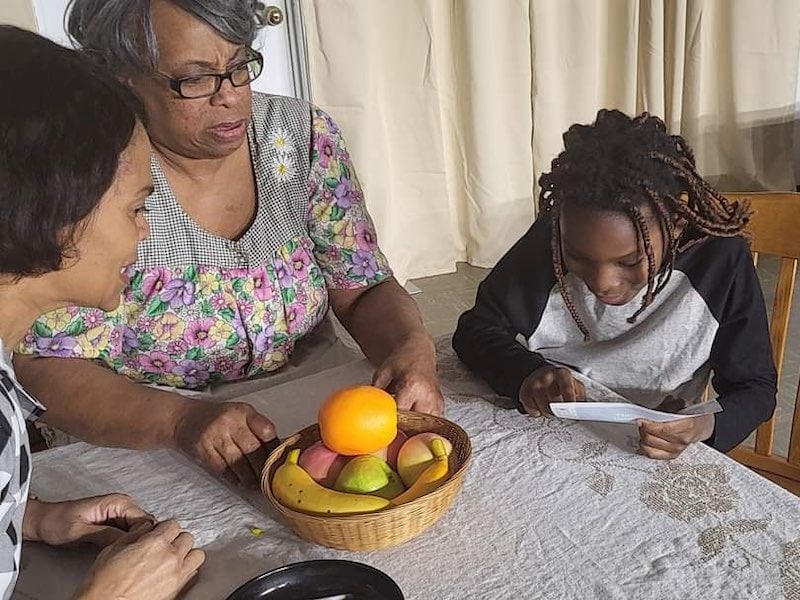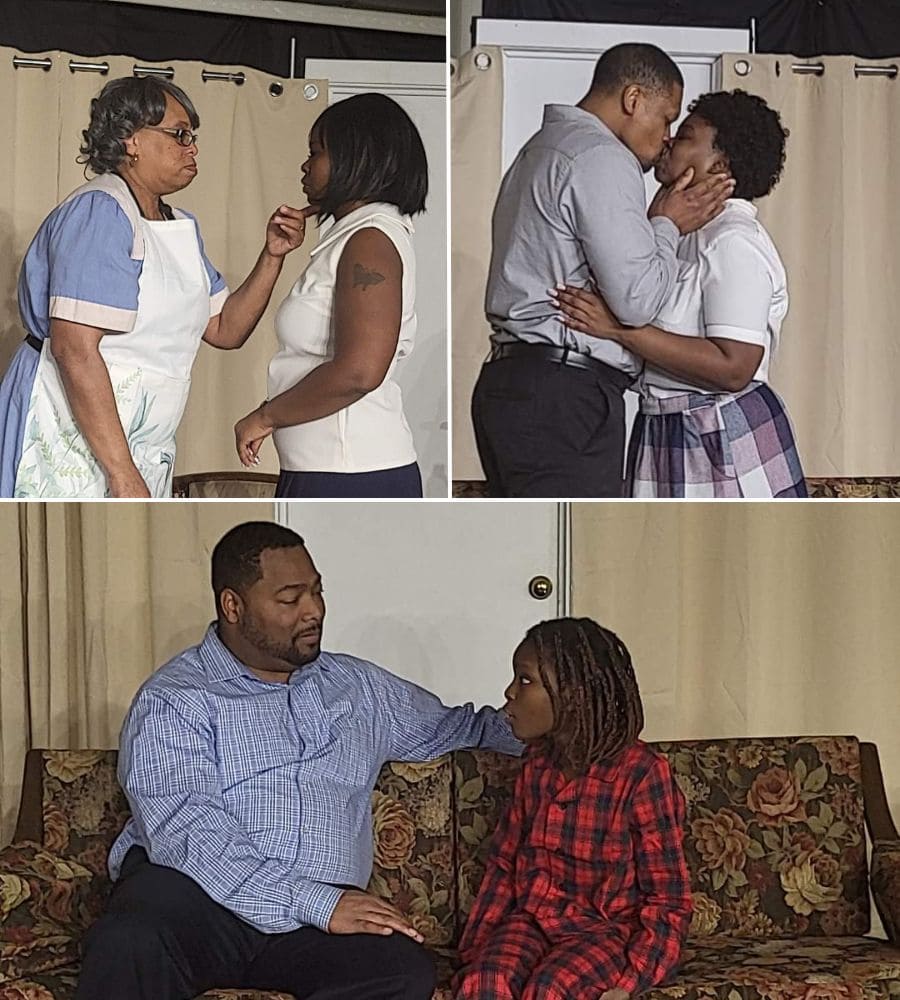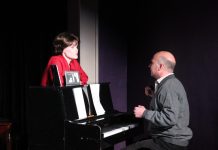By Teniola Ayoola
Editor’s note: This review has been revised and replaces the version that was published on February 27, 2024, titled “UpStage Artists’ ‘A Raisin in the Sun’ does no justice to Lorraine Hansberry.”
There are some hidden gems in UpStage Artists’ A Raisin in the Sun. Like a diamond in the rough, there is nothing a little polishing won’t do to fulfill this production’s overall ambition. Directed by Rick Bergmann, this play brings an acclaimed African American drama to life with an ambitious team of performers.

First produced in 1959, A Raisin in the Sun was the first play to debut on Broadway directed by a Black man and written by an African American woman, Lorraine Hansberry. The play is about the struggles of a Black family with limited resources and big dreams. With all five family members living in one apartment and sharing a communal bathroom, what happens when there is an opportunity to escape out of poverty with a $10,000 insurance check? The matriarch, Lena “Mama” Younger, wants to buy a house; her 35-year-old son, Walter Lee Younger, wants to open a liquor store; her 20-year-old daughter, Beneatha Younger, wants to go to medical school. Walter Lee’s 30-year-old wife, Ruth Younger, is stuck in the middle of it all, tired, pregnant, and mom to their 10-year-old son, Travis Younger. As the only man, Walter Lee feels misunderstood and believes that he lacks the support of the ladies in his family: “That is just what is wrong with the colored woman in this world.… Don’t understand about building their men up and making ’em feel like they somebody. Like they can do something,” he says. When Walter is finally allowed to prove himself as a man of the house, things take an unexpected turn and the future of their dreams becomes uncertain.
Director Rick Bergmann wears multiple hats in this production, serving as the director, the set designer and constructor, the costume designer, the sound and light designer, and light technician. Much credit has to go to Bergmann (alongside Joanne Breen) for creating a set that is just as worn out as Hansberry described if not more so. The backdrop of the “stage” is a long row of tan curtains hung from a pipe with three doors between them. There is a floral double-seater couch, a dining table, and a kitchen all set up in this open arrangement. The one window in Hansberry’s kitchen is represented by a picture frame hung on a wall with a shelf connected to it. The entire milieu is an excellent representation of the “rat trap” apartment that the Younger family is happy to leave in Act II.
With all of the action in this three-act play taking place on a threadbare, stationary set, this production needs all hands on deck to provide dynamism and fluidity. The production suffers from a lack of sound effects in parts (in Act 1 when Beneatha asks why their upstairs neighbor has to vacuum every single day, we do not hear a darn thing); the lights are basic in their functionality of only turning on and off. Additionally, there is a scene where Mama Younger’s outfit seems to be undersized. It’s worth recognizing the challenge of an understaffed production team, and the effort that went into ensuring the play’s core elements were present. Additionally, the entire cast deserves applause for their clear and audible delivery, ensuring the audience could follow the story without the aid of microphones.

Stacey Saunders, playing Ruth Younger, does an excellent job embodying the 30-year-old wife Hansberry describes by saying that “disappointment has already begun to hang in her face.” In the first scene, we see her with pin curls in her hair, a robe, and house slippers that she barely lifts off the floor with each step. Saunders shines in two very pivotal movements. The first one is in Act II when Wiggins as Mama announces to the family that she bought a house. Saunders’ yelp of joy and “Hallelujah!” reverberates in the entirety of the room, and she says, “Goodbye misery, I don’t wanna see your ugly face again!” This is in sharp contrast to her usual tired energy. Saunders’ range of skills further shines when she showcases her desperation to protect this joy at all costs. In Act III, when Mama announces that they may not be able to move into the house after all, Saunders grovels, pleads, and begs, “I’ll work … I’ll work twenty hours a day in all the kitchens in Chicago … I’ll strap my baby on my back if I have to and scrub all the floors in America and wash all the sheets in America if I have to — but we got to MOVE! We got to get OUT OF HERE!!” Saunders’ portrayal helps the audience understand what is truly at stake here and the consequences of a family that caves in and chooses to be defeated by the roadblocks on the path to their dreams. However, one is unable to discern if the stutters and “uh… uh…” that occasionally slip out are part of the fatigue charade or if the actress is forgetting her lines.
There were a few other highlights in the production: In the very first scene, even if one already knows it is going to happen, one still gasps when Mama Younger walks over to Beneatha Younger (played by Tiffany Carletta) and plants a resounding slap on her face for saying that “there simply is no blasted God —.” And when Bobo (played by Edward V. Crews) stops by to announce that Willy absconded with all $6,500 of the leftover insurance money, Wiggins raises her hand to the ceiling in a chilling and captivating manner, kneels slowly to the ground, and cries out for the strength to bear this news. Even as the lights go down, we still hear the sound of her deep lament ringing in our ears.
However, the characters Walter Lee Younger (played by Melvin Smith) and Tiffany Carletta playing Beneatha “Benny” Younger could do well to delve more deeply into their characters. For example, when Mama says to Walter Lee Younger that “something is eating you up like a crazy man,” the statement seems a non sequitur as Smith is hardly believable in that representation. Smith equates emotions of frustration and restlessness with heavings and sighing. But we never fully get that sense of craziness and losing his mind over not being seen or heard as a “man of the house.” Even in Act III when Smith stomps his feet and pounds his chest and yells, “I am a man — and I think my wife should wear some pearls in this world!,” he fails to impress on the audience the depth of anger, frustration, and defeat that this character purports to feel.
In Beneatha’s initial scene, we do not see the conflict build between Beneatha and Walter Lee. The actress storms into the set with a ready-made attitude and instead of her sounding sophisticated, intellectual, and anti-assimilationist, all we get is the stereotypical “angry Black woman” vibe. While she very visibly struggles to remember her lines in some parts, she often remembers to clap 👏🏾 as 👏🏾 she 👏🏾 speaks👏🏾 for extra Black girl emphasis. Additionally, in Act III when her dreams of being a doctor are supposed to be shattered, we hardly remember that she even wanted to be a doctor at all. Carletta says her lines exactly as they were written without adding an ounce of her own characterization to Hanberry’s Beneatha. The traditional Nigerian dance performance in Act II seems farcical instead of a true reflection of a Beneatha who is absorbed and transposed into a new identity of a “Nigerian woman.”
Though this production of A Raisin in the Sun may not be for everyone, it is all toward a good cause, which is to support the Beltsville Volunteer Fire Department. It is important to acknowledge the dedication of artists working with limited means. Their perseverance and love for the play are commendable, even if some elements fall short of a fully realized vision.
Running Time: Two hours and 40 minutes, including one 15-minute and one 5-minute intermission.
A Raisin in the Sun plays through March 3, 2024, presented by UpStage Artists performing at Emmanuel United Methodist Church, 11416 Cedar Lane, Beltsville, MD. Purchase tickets ($10) online.
The program for A Raisin in the Sun is online here.
COVID Safety: Masks are recommended, not mandatory.
 Teniola Ayoola is an arts and culture enthusiast. In her free time, you can find her at an art gallery, an art museum, or at the theater. She has an undergraduate degree in Journalism and Mass Communication from the School of Media and Public Affairs at George Washington University. She has had opportunities to work with the British Broadcasting Corporation (BBC), intern with the Shakespeare Theatre Company, and receive mentorship as a White House Correspondents Association Scholar. She recently graduated with her master’s in Management from Harvard University and is now part of the “Theater U” program for art critics with DC Theater Arts. Follow her on X @TopTeniola!
Teniola Ayoola is an arts and culture enthusiast. In her free time, you can find her at an art gallery, an art museum, or at the theater. She has an undergraduate degree in Journalism and Mass Communication from the School of Media and Public Affairs at George Washington University. She has had opportunities to work with the British Broadcasting Corporation (BBC), intern with the Shakespeare Theatre Company, and receive mentorship as a White House Correspondents Association Scholar. She recently graduated with her master’s in Management from Harvard University and is now part of the “Theater U” program for art critics with DC Theater Arts. Follow her on X @TopTeniola!
CAST
Melvin Smith as Walter Lee Younger
Stacey Saunders as Ruth Younger
Elizabeth Wiggins as Lena Younger
Tiffany Strother as Beneatha Younger
Binta Kassambara as Travis Younger
Antoine Avery as Joseph Asagai
Joey Battley as George Murchison
Ed Crews as Bobo
Peter Rouleau as Karl Lindner





While I appreciate an honest review and can take criticism, I have to respectfully point out that Ms. Ayoola spent more time with her face in her phone than she did watching this show. Our audiences have loved the show and that is more important to us than the review. I hope you don’t let her review speak for you and come out to see the show.
Thanks for sharing that information and I apologize if that was the case. Our reviewers should be focusing on the show they are seeing and nothing else.
Thank you for responding.
Mr. Bergmann,
I appreciate you reading the review and leaving a comment. I take notes on my phone because it is difficult for me to see or write legibly enough take notes in the dark with a pen and paper. Additionally, if I was not attentive, it would be close to impossible to write such a detailed review. As far as your audiences loving the show that’s great to hear! After-all, this is just a my review nothing more. Everyone is entitled to their perception of the production.
No ma’am, you are reviewing community theater, not Broadway. You were rude to our staff and did not appear to be paying much attention to the performance. You were out of line with this review.
Oh wow. I apologize for any perceived rudeness to the staff because that was not my intention. Could you please explain specifically in which ways I came across as rude?
Our staff checked you in and handed you a program and you shot back with “Is this it?” before they could show you to the theater. According to the three staff who were there you seemed annoyed and didn’t really want to be there. You seemed agitated that there wasn’t more for you. But that is water under the bridge at this point and it could have been a complete misreading of the situation.
I can appreciate criticism but I feel you were unduly harsh to a community theater production staffed entirely by volunteers both in front of and behind the curtain. It doesn’t bother me that you didn’t care for my direction, that I can live with. As you said, it’s your opinion, but I will defend my cast and their choices to the end. You didn’t need to be so harsh to them. We keep our budgets low so that we can keep our ticket prices low. Community theaters like ours give people a chance to see live theater when many theaters are out of their price range. For the record, our pipe and drape system isn’t a clothes as you claimed in the earlier version of this review. Also, we didn’t tape a laminated picture to a wall, it was a picture frame hung to suggest a window. Our shows need to be able to be put up and taken down quickly because we perform in a shared space. I appreciate you taking the time to come out to the production, but you need to keep in mind that not all theaters are on the same level and that each is trying to bring something to their community. To say the production was excruciating was out of line. I wish you well in your future endeavours.
This is an incredibly mean spirited review for a community theatre production. Glad you took it off your Instagram at least.
Exactly. I can take criticism but this was just cruel. Those performers worked their butts off and she barely watched the show.
Wow, I have been reading DC Theater Arts community theater reviews for a few years now and never thought I would see something like this. I always appreciate how your reviewers shine a positive light on community theater. This is just unkind and nasty. I am surprised you posted it. I hope this is an exception and not something that becomes normal. I understand not all productions are perfect but this was just uncalled for. Good luck to UpStage Artists with their show.
Well detailed review which should be taken in good spirit and giving room for improvement. It is also an eye opener for people that want to invest in the area with budget . Good job Teni . Good job producer. I will love to watch the show
Wow, this is…lol.
I think it’s clear that the reviewer watched the play closely based on the level of detail in the review. She gave a fairly plausible explanation for her phone use.
But yeah, this is community theater, and based on the other responses, this isn’t the usual tone with which these productions are critiqued. So that begs the question:
Who is editing this section? And why the deviation from the norm? And were the expectations of the tone communicated with the author or are we feigning concern after the producer expressed his reservations?
Anyway, if nothing else, this has certainly sparked some interest because I definitely had no plans to see this play, but now I kind of want to!
All the best to the producer, the actors and Ms. Ayoola.
Thanks, Teniola, for reviewing.
I believe the author correctly praises great performances and essential moments that resonate with the viewers, emphasizing the value of such depictions in expressing the characters’ emotional depth and experiences.
Simultaneously, it’s understandable that the critic could have portrayed it more positively; the review revealed that the production fell short of expectations, from technical difficulties like sound and lighting to inconsistent character portrayal and pacing. This constructive criticism can provide valuable insights for the production team.
This a very detailed review and I am very impressed with the way it was written. I would also like to comment on feedback from Mr Benjamin, you do need to understand sir, that a review is an opinion of the person writing the review. You may want to consider looking into the listed shortfalls of the play rather than been offended by the writer. If a song is badly sang, it’s badly sang whether it be a fun karaoke night performance or a concert we should give our best If we want to get the best reaction. Do not let your bias towards Ms Ayoola as a person affect the necessary changes to your production. I wish you best of luck in future production. Once again Ms Ayoola your write up is Amazing. We hope to see more of it.
Wow👏👏👏 this is well detailed … it’s like I m watching the show from this… I must commend Teni for the effort to look deep into hiccups of the show . Credits to the set design as it portrayed …well I think it best the director should take this is in good spirit and work on what needs to be worked .. you can’t be an all rounder… involve more people in the sound, and more key areas so you can pay more attention to tireless effort of your actors.
Well done Teniola on your analysis of ‘A Raisin in the Sun does no justice to Lorraine Hansberry’ .I can genuinely feel the strength of your review through your perspective. Exceptional work!”
This was a well written review that had me in stitches! Teniola’s honesty and humor piqued my interest. Though this play was not on my radar I am now curious to see it.
I say A VERY GOOD REVIEW!!! From Teni’s review, I’ll love to watch the show.
Princess Teniola is a very good and kindhearted philanthropist with pleasant disposition. She is very honest in whatever she does. She calls a spade by it’s name.
I’m proud to say that she is one of Christ Orphanage Home Ondo’s Major Sponsor. She loves the Orphans, less privileged children and vulnerable children . She’s ready to spend her last cent on them.
We love and appreciate your support, love, kindness, concern and generosity towards us in Christ Orphanage Home Ondo And Our Non-Fee Nursery And Primary School.
The Good LORD will surely repay you abundantly for all your efforts on us at the time of your needs. In Jesus Mighty Name. AMEN ♥️ 🙏 ♥️. Cheers And SHALOM Dear Beautiful Princess Teniola.
A VERY GOOD REVIEW!!!
Good job you did there, Christ Orphanage Home Ondo’s Major Sponsor.
Love to watch the show.
Wow the author gives a no holds barred criticism of the work! So, I see how those that put their efforts into this will find it hard to digest. However I did find the write up a reflection of the author’s perception rather than a lack of attention to the film. She highlighted areas she enjoyed in the play and areas where she thought could use some work like a true critic. She also portrayed her honest opinion about how she felt while watching the show. She draws a great picture that I could envision while reading the article.
I will say perception may also vary depending on there taste of the viewer. For example, I just watched Tyler Perry’s Mea Culpe. While some people found this incredible, others found it terrible. I say watch for yourself and see! After reading this review, I am interested in going to watch the play!
Should DC theater tell their writers to write out only positive reviews? Perhaps, a disclaimer that writers will be fully honest in their perception with their write up. I think many lessons could be learned here and taken into account for future publishings.
All in all, I thoroughly enjoyed Teniola’s write up. She is an incredibly talented writer and I look forward to more of her writing
Wow the author gives a no holds barred criticism of the work! So, I see how those that put their efforts into this will find it hard to digest. However I enjoyed reading and did find the write up a reflection of the author’s perception rather than a lack of attention to the film. She honestly portrayed how she felt while watching the play, which was not all great but she gave positive notes to areas that she enjoyed! I could envision watching the play from her descriptive writing.
I will say perception varies depending on the taste of the viewer. For example, I just watched Tyler Perry’s Mea Culpe. While some people found this incredible, others found it terrible. I say watch for yourself and see! After reading this, I am interested in going to watch the play!
I think many lessons could be learned and putting personal feelings aside, the constructive criticism may be helpful for future plays!
All in all, I enjoyed Teniola’s write up. She is an incredibly talented writer and I look forward to more of her work!
This will be my last post on this review. I want to thank everyone who commented (both supporting the review and those who thought it was too much) including Ms. Ayoola. She didn’t need to take the time to respond and she did. I will admit, I was taken aback by the abrasiveness of the review. I have been working in community theater for a long time and I have never seen a harsh review like this one. I have been reviewed and had things said about me before as both an actor and a director and it has never bothered me nor has it ever been this harsh. It hasn’t always been glowing reviews, some like my style, others don’t. But, when you knock my cast, who gave up their free time to do something they love in order to bring something to the community, it seemed out of line. As I said at the beginning, thank you to all who have commented. We hope that you continue to enjoy and support community theater.
Thank you! Same to you!
Thank you! Same to you. I know some of the proceeds from this show will go to the Beltsville Volunteer Fire Department. Anyone interested may donate here: https://upstage-artists-incorporated.ticketleap.com/support-the-beltsville-vfd/
https://upstage-artists-incorporated.ticketleap.com/support-the-beltsville-vfd/
Thank you to Mr. Bergmann, the show’s director for handling this situation with grace. And thank you, Teniola for pointing out the link to donations. I will be donating and am grateful that this review led me to that link.
Part of DC Theater Arts’ mission is to train a new generation of arts critics. Our mantra – one that we share with all new writers – is that criticism should be constructive and never cruel. This review did not live up to that and as the site’s publisher, I apologize to all involved. I should have worked with the writer more intensely to ensure that she was aware that this was a community theater production. I should have been more rigorous in discussing the hurtful aspects of this review with the writer before it was published. I have deep respect for community theater artists who dedicate their time and passion to this art form that we all love. We will be more careful in the future to ensure all new writers are aware of the need to be constructive in criticism. I want DCTA to be a place that lifts the community up, not tear it down.